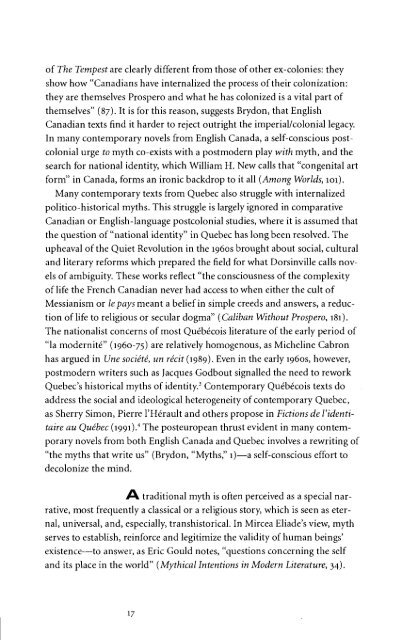The Carpathians - University of British Columbia
The Carpathians - University of British Columbia
The Carpathians - University of British Columbia
You also want an ePaper? Increase the reach of your titles
YUMPU automatically turns print PDFs into web optimized ePapers that Google loves.
<strong>of</strong> <strong>The</strong> Tempest are clearly different from those <strong>of</strong> other ex-colonies: they<br />
show how "Canadians have internalized the process <strong>of</strong> their colonization:<br />
they are themselves Prospero and what he has colonized is a vital part <strong>of</strong><br />
themselves" (87). It is for this reason, suggests Brydon, that English<br />
Canadian texts find it harder to reject outright the imperial/colonial legacy.<br />
In many contemporary novels from English Canada, a self-conscious postcolonial<br />
urge to myth co-exists with a postmodern play with myth, and the<br />
search for national identity, which William H. New calls that "congenital art<br />
form" in Canada, forms an ironic backdrop to it all (Among Worlds, 101).<br />
Many contemporary texts from Quebec also struggle with internalized<br />
politico-historical myths. This struggle is largely ignored in comparative<br />
Canadian or English-language postcolonial studies, where it is assumed that<br />
the question <strong>of</strong> "national identity" in Quebec has long been resolved. <strong>The</strong><br />
upheaval <strong>of</strong> the Quiet Revolution in the 1960s brought about social, cultural<br />
and literary reforms which prepared the field for what Dorsinville calls novels<br />
<strong>of</strong> ambiguity. <strong>The</strong>se works reflect "the consciousness <strong>of</strong> the complexity<br />
<strong>of</strong> life the French Canadian never had access to when either the cult <strong>of</strong><br />
Messianism or le pays meant a belief in simple creeds and answers, a reduction<br />
<strong>of</strong> life to religious or secular dogma" (Caliban Without Prospero, 181).<br />
<strong>The</strong> nationalist concerns <strong>of</strong> most Québécois literature <strong>of</strong> the early period <strong>of</strong><br />
"la modernité" (1960-75) are relatively homogenous, as Micheline Cabron<br />
has argued in Une société, un récit (1989). Even in the early 1960s, however,<br />
postmodern writers such as Jacques Godbout signalled the need to rework<br />
Quebec's historical myths <strong>of</strong> identity. 3 Contemporary Québécois texts do<br />
address the social and ideological heterogeneity <strong>of</strong> contemporary Quebec,<br />
as Sherry Simon, Pierre l'Hérault and others propose in Fictions de l'identitaire<br />
au Québec (1991). 4 <strong>The</strong> posteuropean thrust evident in many contemporary<br />
novels from both English Canada and Quebec involves a rewriting <strong>of</strong><br />
"the myths that write us" (Brydon, "Myths," 1)—a self-conscious effort to<br />
decolonize the mind.<br />
A traditional myth is <strong>of</strong>ten perceived as a special narrative,<br />
most frequently a classical or a religious story, which is seen as eternal,<br />
universal, and, especially, transhistorical. In Mircea Eliade's view, myth<br />
serves to establish, reinforce and legitimize the validity <strong>of</strong> human beings'<br />
existence—to answer, as Eric Gould notes, "questions concerning the self<br />
and its place in the world" (Mythical Intentions in Modern Literature, 34).

















